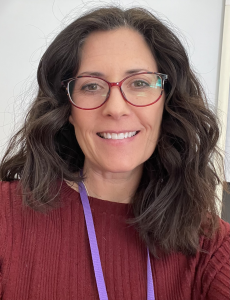Theater group raises awareness, receives award
November 10, 2015
Stepping into the IVCC Cultural Center auditorium on Wednesday night, audience
members were immediately ushered onto the stage where chairs had been set up for the audience making the production a much more personal affair. Sharing the stage are cut-outs of women and children; they are part of the Silhouettes Project for women and
children who died due to domestic violence. Each silhouette has a small plaque of text for others to read, detailing their individual stories.
The Domestic Violence Awareness project was created when Freedom House received
a grant to do a demonstration in which they invited local agencies dealing in domestic violence and abuse cases. Now open to the public, a small flood of people quickly filled the seats.
In an interview, David Kuester, theater and speech teacher at IVCC, explained that while working to coordinate the project, he and Amber Killian, a Freedom House advocate, set the goal to help educate and re-humanize the clients in order to prevent these “road blocks” that are created in the system.
By educating those in the field of human resources; they are reminded that they are working with people, not clients.
He details the story of the voice that has to get through, the voice that society often turns its back on.
The production begins with the actors on their feet, brandishing newspapers and iPhones, reading from similar news articles. They spew a whirlwind of statistics and facts, about women in domestic violence to the number of children affected; all speaking louder and over-lapping each other to create a noise of voices all ending with, “Someone should do something about this.” Thus begins the journey.
There was a constant stream of dialogue in poem format, divided up between the actors as they expressed what home meant to them and how domestic violence made them feel, what they wanted to do, and what they feel they cannot do.
One actress was singled out as the group divided. One group, symbolizing both the self-doubt and public polarization, pulled her aside and began wrapping her in caution tape.
The group then detailed that the girl could not do anything on her own, that no one would believe her, and that she was stupid for trying.
Breaking free, another group, representing the legal system, wrapped her in red tape whilst detailing the paperwork she would need to fill out, the lack of funding stopping them from helping her, and the heinous task of getting a temporary order of protection.
She was then presented with Hula-Hoops that were used to represent the social and political hoops women have to jump through to get help and away from their abusers.
The process was frustrating to watch because of the rules and regulations, paying for daycare, having to take parenting classes, having housing found counties away, and the process of obtaining a restraining order by having a cross examination with the abuser.
The production was brought to an end with a closing speech by Killian, who explained the
steps of getting out of an abusive relationship and rebuilding your life abuse-free by starting relationships slow, setting boundaries based on your comfort, and
creating a world of independence, not dependence.
This was followed by a speech by Lori Wilson, the author of the poem including in the production dialogue.
A former Freedom House client, Wilson, who agreed to have her name featured in this article, shared her story with the audience.
She detailed her feelings of isolation and hopelessness, and then her feelings of happiness
when she was free, of relearning to be herself and laughing again.
The crowd was so moved by her speech she was met with a round of applause, then recognition for her bravery and hugs from the audience after the show.
Afterwards, in an interview, Killian, the Freedom House shelter advocate, said she had met with the acting troupe twice, and was blown away by how well they did.
It was the exact kind of outreach she had been aiming to create, a more “in your face” impact capitalizing on the fact that the women in the stories featured are capable and they are strong, but they need help. If that help is not offered, the victim often returns
to the relationship for financial stability or out of feelings of hopelessness.
Although the production as a whole was geared more towards women, Amber Killian made sure to state in her opening message and in the interview that domestic violence can also happen to men.
“Men are victims too. That doesn’t mean that they are weak, it just means they don’t hit back.” Freedom House also works with men and helps them find safe housing as well.
Domestic violence, or partner abuse, has many faces and not all of them are physical.
Partner abuse may be bullying, when the person you are in a relationship with constantly insults, disrespects, or isolates you in rage.
Partner abuse can be your partner constantly taking your phone, stalking your social media, or regulating who you do and do not speak to.
Partner abuse could be not allowing you to have a job, controlling your money, or denying you sleep.
Partner abuse is not always constant. Even if it only happens once or twice, no matter how insignificant it may seem later, it is still abuse.
But one very important tip you need to know and believe: It is not your fault.
Learn the signs and if you need help, or just need to talk, please call the numbers below for information on how to get help.
There is a 24-hour hotline, a 24-hour emergency shelter, free counseling and therapy, and medical and court advocacy.
Freedom House: (800)-474-6031
Domestic and Sexual Violence: (815)-872-0087




